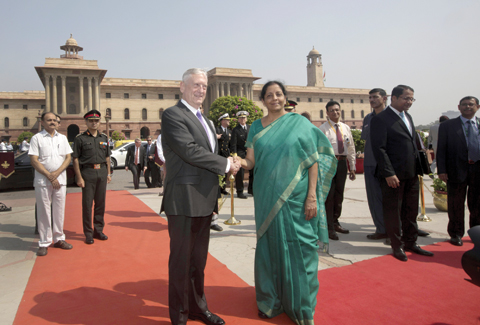 NEW DELHI: Indian Defense Minister Nirmala Sitharaman, center right, shakes hands with US Defense Secretary Jim Mattis center, upon his arrival at the Defense Ministry office, in New Delhi, India, yesterday. —AP
NEW DELHI: Indian Defense Minister Nirmala Sitharaman, center right, shakes hands with US Defense Secretary Jim Mattis center, upon his arrival at the Defense Ministry office, in New Delhi, India, yesterday. —APNEW DELHI: India will not deploy troops to Afghanistan as part of a new US strategy for the war-torn country, the Indian defense minister said yesterday, but she promised to boost support for the recently unveiled effort. After talks with US Defense Secretary Jim Mattis, Nirmala Sitharaman said India was prepared to increase training for Afghan personnel and help develop critical civilian infrastructure such as schools and hospitals.
"India's contribution to Afghanistan has been for a very long time, and has been consistently on developmental issues," Sitharaman said at a news conference with Mattis. The "contribution has been on these grounds and we shall expand if necessary. However as we have made it very clear, there should not be boots from India on the ground." Mattis' trip to India is the first by any member of President Donald Trump's cabinet. It comes just after Trump unveiled a new Afghanistan strategy and urged New Delhi to help. "We applaud India's invaluable contributions to Afghanistan and welcome further efforts to promote Afghanistan's democracy, stability and security," Mattis said. India has long vied with arch-rival Pakistan for influence in Afghanistan, building dams, roads and a new parliament in the troubled country. Last year it offered some $1 billion in aid.
It has also trained more than 4,000 Afghan National Army officers and provided helicopters to the Afghan Air Force. Unveiling his Afghanistan policy last month, Trump angered Pakistan by saying it offered safe haven to "agents of chaos". "There can be no tolerance of terrorist safe havens," Mattis said Tuesday, without referencing Pakistan. "As global leaders, India and the United States resolve to work together to eradicate this scourge."
Bite the bullet
In Afghanistan, the Taliban are continuing to mount deadly attacks, control large areas of territory and are killing Afghan forces in the thousands. Under the plan, the US is sending more than 3,000 additional troops to Afghanistan to train and advise the country's security forces. There is no timeline on when the US may pull its troops out-a change from under Barack Obama, who set dates for when he wanted troops home.
But critics have questioned what the extra US soldiers can accomplish that previous forces-who numbered some 100,000 at the height of the fighting-have not. Earlier this year Afghan President Ashraf Ghani ordered a near doubling of the country's elite fighting force from 17,000 as part of a four-year roadmap that also aims to strengthen Afghanistan's air force. While Trump's commitment to increase American troop numbers and leave them there indefinitely has been welcomed by Afghan authorities, they know it will take time to improve the fighting abilities of their security forces.
Asia expert Michael Kugelman of the Woodrow Wilson Center was not surprised India is avoiding putting troops into the fight. "The risks of provoking Pakistan are perceived to be too great," Kugelman said. He outlined another, riskier possibility-that India might be more open to ship arms to Afghanistan. "New Delhi has rarely sent large, lethal weaponry to Kabul, other than a small fleet of fighter helicopters some months back," he said. "But it may well bite the bullet and contend that the need to strengthen the Afghan security forces outweighs the risk of angering the Pakistanis."--AFP










